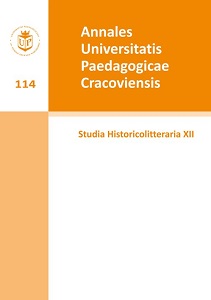Nowoczesny homo militans i narracje legionowe w Pamiętnikach generała broni Leona Berbeckiego
Modern homo militans and the narrative structure of Pamiętniki generała broni Leona Berbeckiego (The Diaries of Lieutenant-General Leon Berbecki)
Author(s): Jacek RozmusSubject(s): Cultural history, Studies of Literature, Military history, 19th Century
Published by: Wydawnictwo Uniwersytetu Komisji Edukacji Narodowej w Krakowie
Keywords: Leon Berbecki’s diaries; literature; general;
Summary/Abstract: The literary value of Leon Berbecki’s diaries rests primarily on their narrative structure. The narrator recounting military exploits of the Polish Legions is a professional soldier, a veteran of Russo-Japanese war who at the same time cherishes his family legacy connected with the national uprisings of 1830 and 1863. Therefore, as a writer, Berbecki does not discard the romantic military ethos, strongly present in legionary prose, but describing battles in (Eastern European) Galicia, presents his soldiers engaged in modern warfare. The fight for Polish independence, epitomised by the Legions, is assessed in terms of its command, logistics and conditions on battlefields. The literary representation of the World War I in Berbecki’s diaries shows the Great War as the formative event, which shaped the legacy of Polish Romanticism. At the same time, the representation displays certain conventional features typical of European war narratives. The soldier’s duty, the importance of training, the sense of fellowship are presented as prerequisites for the nation’s survival also in the works of Ernst Jünger.
Journal: Annales Universitatis Paedagogicae Cracoviensis. Studia Historicolitteraria
- Issue Year: 2012
- Issue No: 12
- Page Range: 150-161
- Page Count: 12
- Language: Polish

